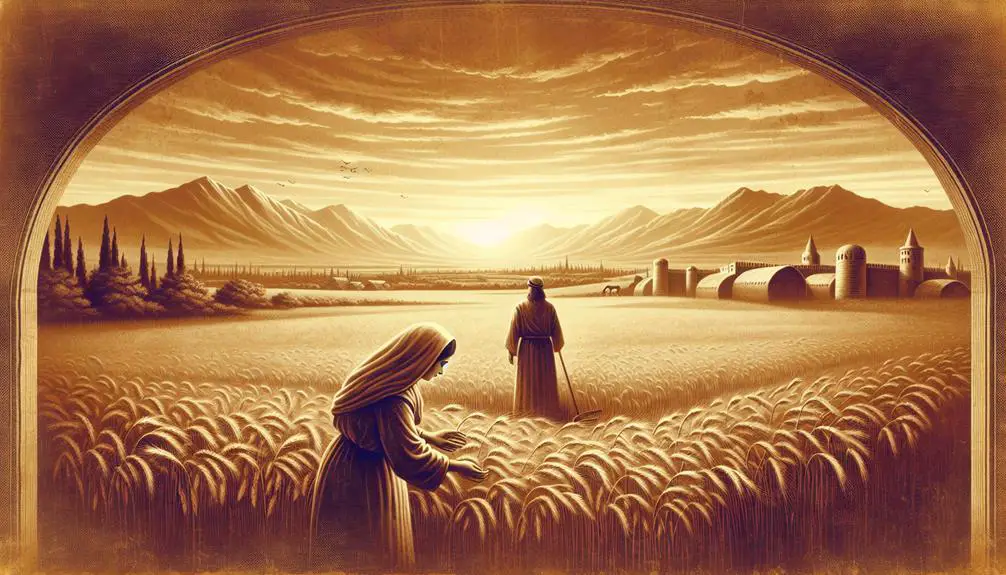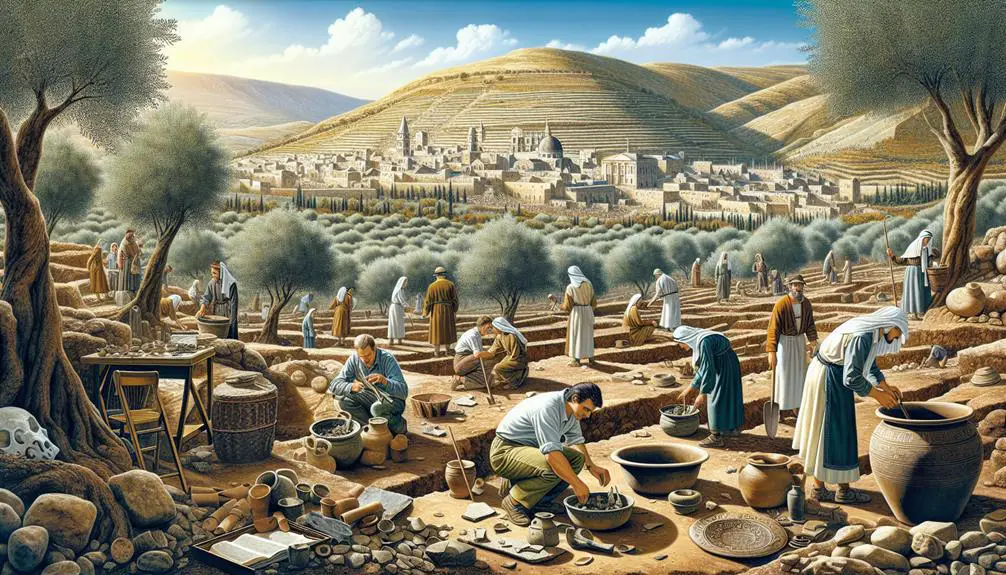Immerse yourself in the enigmatic biblical history of Ephrathah, a place where ancient narratives and prophetic significance intriguingly converge.

Ephrathah in the Bible
You might not be aware that Ephrathah, often overshadowed by its more commonly known counterpart, Bethlehem, holds a unique place in biblical narratives. This ancient locale is not just a geographical marker but a key to understanding pivotal moments in the scriptural text, from its mention in Genesis to its prophetic significance in Micah.
As you explore Ephrathah's layers, from its origins to its role in the Ruth and Boaz story, and its archaeological insights, you'll uncover its profound impact on biblical history and modern faith. This journey promises to enrich your understanding of a place that's more than a mere backdrop in the scriptural saga.
Key Takeaways
- Ephrathah is symbolic of fruitfulness and abundance, central to patriarchal narratives and God's covenant.
- It is the prophesied birthplace of the Messiah, enhancing its theological significance.
- The region's agricultural prosperity and strategic location influenced biblical stories and cultural exchanges.
- Archaeological findings in Ephrathah provide insights into ancient urban planning, spirituality, and trade practices.
Origins of Ephrathah

Ephrathah, often intertwined with biblical narratives, holds its origins in ancient texts, where it's depicted as both a significant geographical location and a symbol of fertility and prosperity. As you dive deeper into the cultural and linguistic roots of Ephrathah, it becomes clear that the name meanings and cultural context surrounding this term provide a rich tapestry of understanding that transcends mere geographical identification.
Delving into the name meanings, 'Ephrathah' is thought to derive from a Hebrew word that suggests 'fruitfulness' or 'abundance.' This etymology isn't just a linguistic curiosity; it reflects the cultural context in which Ephrathah was situated. In the ancient Near Eastern world, fertility and the capacity to support agricultural prosperity were paramount. Hence, a place name embodying such qualities would be held in high regard, symbolizing not only the physical fertility of the land but also the spiritual and communal prosperity of its inhabitants.
The cultural context of Ephrathah further illuminates its significance. In a time when survival closely tied communities to the land they cultivated, Ephrathah's connotations of fruitfulness would resonate deeply. It represented an ideal, a benchmark for what communities aspired to be—fertile, prosperous, and blessed. These associations with fertility and prosperity aren't mere happenstance; they're woven into the very fabric of the name Ephrathah, reflecting the values and aspirations of the ancient societies that revered it.
In essence, Ephrathah's origins reveal a profound connection between name, place, and cultural identity. The analytical exploration of its name meanings and cultural context offers a glimpse into the collective psyche of ancient societies, where the prosperity of the land was inextricably linked to the prosperity of its people.
Ephrathah in Genesis

In the Book of Genesis, the narrative introduces us to the region of Ephrathah as a backdrop for pivotal moments in the patriarchal stories, underscoring its significance both historically and theologically. Ephrathah, often linked with Bethlehem, emerges as a critical location for events that shape the foundational narratives of the Jewish faith and early biblical history.
Here's why Ephrathah is pivotal:
- Cave Burials: Ephrathah is notably associated with the burial of key patriarchal figures, highlighting its importance as a sacred resting place.
- Famine Journeys: The region serves as a departure point for significant famine journeys, underscoring its role in the survival narratives of biblical figures.
- Patriarchal Stories: Ephrathah is woven into the fabric of the patriarchal stories, acting as a stage for God's unfolding covenant with His people.
- Theological Significance: Its mention in Genesis ties Ephrathah to themes of promise, provision, and God's faithfulness.
- Historical Context: The narrative places Ephrathah in a broader historical context, suggesting its long-standing significance in the ancient Near East.
Ephrathah's mention in Genesis isn't merely geographical; it's deeply entwined with the spiritual legacy of the Jewish people. The region's association with cave burials, for instance, not only underscores its sacredness but also reflects ancient customs and beliefs surrounding death and the afterlife. Similarly, the famine journeys originating from or leading to Ephrathah highlight the region's role in the survival and continuity of biblical patriarchs, further elevating its importance within the biblical narrative. Through these elements, Genesis paints Ephrathah as a locus of divine action and human experience, making it a key piece in understanding the biblical world.
The Ruth and Boaz Connection

The narrative of Ruth and Boaz unfolds in the region of Ephrathah, offering a profound exploration of loyalty, redemption, and the intertwining of individual lives with broader divine purposes. This story, deeply rooted in the cultural and religious practices of its time, gives us an intricate look at marital customs and harvest festivals, essential elements of ancient Hebrew life.
Aspect |
Description |
Relevance to Ruth and Boaz |
|---|---|---|
Marital Customs |
Involved leveraged marriages and the redemption of land. |
Boaz marries Ruth, redeeming Naomi's land and ensuring their lineage. |
Harvest Festivals |
Times of communal gathering and thanksgiving. |
Ruth meets Boaz while gleaning barley during the harvest. |
Divine Purposes |
Belief in divine orchestration of events. |
Their marriage is seen as part of God's plan for Israel. |
Loyalty |
Deep commitment to family and community obligations. |
Ruth's loyalty to Naomi brings her to Boaz, leading to their union. |
This tableau sets the stage for a detailed exploration of how these customs and festivals not only shape the personal journey of Ruth and Boaz but also reflect the societal norms and divine interplay at work. Their story, while deeply personal, is a testament to the broader themes of faithfulness, divine provision, and the intricate dance between human agency and divine will. Through their union, we see the fulfillment of social and religious obligations, underpinned by a profound sense of loyalty and the hand of providence, illustrating the complexity and depth of marital customs and harvest festivals in their time.
Micah's Prophecy Fulfilled

While exploring the rich tapestry of Ruth and Boaz's story provides insight into ancient customs and divine orchestration, it's crucial to examine how Micah's prophecy, emerging from the same region, finds its fulfillment in the broader narrative of the Bible. You'll see, as you delve deeper, that the strands of prophetic interpretations and Messianic expectations intricately weave through the fabric of Scripture, culminating in a fulfillment that both astonishes and enlightens.
To grasp the significance of Micah's prophecy being fulfilled, consider these points:
- Geographical Precision: The prophecy specifies Ephrathah, pinpointing the Messiah's birthplace with remarkable accuracy.
- Historical Context: It's set against a backdrop of tumultuous times, offering hope through the promise of a leader from humble origins.
- Messianic Expectations: The prophecy shapes the Jewish anticipation of a Messiah, directly influencing the New Testament's portrayal of Jesus's birth.
- Prophetic Interpretations: Early Christian writers and theologians saw in Micah's words a clear prediction of Christ's birth in Bethlehem, reinforcing the prophecy's authenticity and divine inspiration.
- Cultural Impact: This fulfillment has deeply influenced both Jewish and Christian traditions, shaping festivals, liturgies, and theological discussions.
Analyzing Micah's prophecy, you're not just unpacking an ancient prediction but are tracing its threads through history to see how it weaves into the very heart of biblical revelation. It's a journey that illuminates the past, enriches the present, and offers hope for the future, all while demonstrating the intricate fulfillment of Messianic expectations and the enduring power of prophetic interpretations.
Ephrathah's Biblical Significance

You'll find that Ephrathah's significance in the Bible extends beyond mere geography; it's intricately tied to pivotal ancestral narratives. Its location isn't just a backdrop but a key player in unfolding sacred histories, revealing deep connections to figures central to biblical lore.
Analyzing its mention across scriptures offers insights into its multifaceted role in the tapestry of biblical events.
Ephrathah's Geographic Importance
Ephrathah's strategic location played a pivotal role in its biblical significance, serving as a key crossroads in ancient narratives. Its position influenced not only the stories that unfolded there but also how it interacted with surrounding regions. The climate and trade routes that passed through Ephrathah had a profound impact on its development and role in biblical history.
- Climate Influence: Its unique climate fostered agricultural prosperity, making it a bustling hub.
- Trade Routes: Ephrathah lay on major trade routes, facilitating cultural and goods exchange.
- Strategic Crossroads: Its location made it a pivotal meeting point for travelers and traders.
- Biblical Events: Many biblical narratives are set against the backdrop of Ephrathah's geography.
- Cultural Exchange: The trade routes enabled a rich exchange of ideas and beliefs, shaping its spiritual significance.
Ancestral Connections Unveiled
Building on its geographic importance, Ephrathah also stands out for its deep ancestral connections that are crucial to understanding its biblical significance. This location isn't just a dot on the ancient map; it's a nexus of family lineage and cultural traditions that have shaped the narrative of the Bible.
You'll find that Ephrathah's significance is intertwined with pivotal biblical figures, anchoring their stories not just in spirituality, but in the very earth they walked upon. The ancestral ties in Ephrathah offer a tangible connection to these stories, grounding them in a reality that transcends generations.
Analyzing these connections, you uncover layers of meaning that enrich our understanding of biblical texts, revealing how deeply our spiritual heritage is woven into the fabric of family and cultural identity.
Archaeological Insights

Through archaeological findings, it's become clear that Ephrathah held significant cultural and historical importance in the ancient world. Site excavations and artifact discoveries have illuminated our understanding of this enigmatic locale, offering a tangible connection to the narratives woven throughout biblical texts.
The excavation efforts in the presumed area of Ephrathah have yielded a wealth of information, shedding light on the daily lives, religious practices, and societal structure of its ancient inhabitants. These findings not only corroborate historical accounts but also provide a nuanced perspective on the intersection of faith, culture, and history in this region.
To capture the essence of these archaeological insights, consider the following key points:
- Excavation sites have revealed complex urban planning, indicating a sophisticated society with a high degree of organization.
- Numerous inscriptions found on pottery, stones, and seals offer insights into the linguistic evolution and literacy rates within the society.
- Religious artifacts, including figurines and temple remnants, suggest a rich spiritual life intertwined with the everyday.
- Agricultural implements and food residue point to advanced farming techniques and dietary habits.
- Trade goods and currency unearthed at the site attest to Ephrathah's role in regional trade networks.
These discoveries enrich our understanding of Ephrathah, painting a vivid picture of its significance in the ancient world. They not only corroborate biblical references but also invite a deeper exploration of the cultural and historical contexts that shaped this storied location. Through careful analysis and scholarly examination, the archaeological insights gleaned from Ephrathah continue to fascinate and inform.
Ephrathah in Modern Faith

In modern religious practices, Ephrathah remains a focal point of interest, deeply embedded in the collective memory and faith of many communities. Its mention in biblical narratives, particularly regarding its association with significant biblical figures and events, has ensured its continued relevance. You'll find that contemporary interpretations of Ephrathah do not merely linger on its historical or geographical significance but extend into the realm of spiritual relevance, offering insights and applications for modern faith communities.
Aspect |
Description |
|---|---|
Historical Context |
Ephrathah's roots in biblical history provide a rich backdrop for sermons and teachings, allowing believers to connect with their spiritual heritage. |
Symbolic Meaning |
In literature and homilies, Ephrathah symbolizes fertility, abundance, and God's providence, encouraging faith and reliance on divine provision. |
Contemporary Relevance |
Scholars and theologians draw parallels between the challenges faced by the inhabitants of Ephrathah and those encountered by modern believers, promoting resilience and faithfulness. |
Spiritual Reflections |
Ephrathah's story inspires personal and communal reflection, urging individuals and communities to consider their journey of faith in light of biblical narratives. |
These aspects highlight how Ephrathah's legacy, enriched by contemporary interpretations, continues to inspire and challenge believers. Its spiritual relevance is evident in the way it informs faith practices, encourages deeper biblical engagement, and fosters a sense of continuity with the past. As you delve into the story of Ephrathah, you're invited to reflect on its enduring legacy and what it means for your own spiritual journey.
Frequently Asked Questions
How Has the Interpretation of Ephrathah's Significance Evolved in Different Christian Denominations Over Time?
You've noticed that the significance of Ephrathah's theology has shifted across denominational traditions over time.
Initially, interpretations were quite uniform, but as denominations developed their own theological identities, perspectives on Ephrathah diversified.
Today, you'll find that some view it symbolically, while others cling to historical or prophetic interpretations.
This evolution reflects broader trends in how denominations differentiate themselves through scriptural analysis, emphasizing the dynamic nature of religious interpretation.
Are There Any Notable Artworks or Literature That Feature Ephrathah Prominently, and What Themes Do They Explore?
You're diving into a time machine, exploring how Ephrathah has inspired artistic interpretations and literary motifs.
Artists and writers have woven its essence into their works, exploring themes of origins, divinity, and belonging. These creations range from Renaissance paintings to modern novels, each dissecting its significance from unique angles.
How Do Contemporary Jewish Scholars and Communities View the Historical and Spiritual Relevance of Ephrathah?
You'll find that contemporary Jewish scholars and communities deeply explore Ephrathah's etymology and historical significance, engaging in scholarly debates that delve into its spiritual relevance.
They analyze how its origins and meanings reflect on their heritage and faith, offering a rich tapestry of interpretations.
These discussions not only illuminate the past but also connect deeply with present spiritual practices, highlighting Ephrathah's enduring legacy in Jewish tradition and thought.
Has Ephrathah Inspired Any Modern Geographical Namesakes or Locations, and What Led to Their Naming?
You're exploring how modern parallels of ancient namesakes, like Ephrathah, have emerged through naming conventions. These conventions often reflect a desire to connect with historical or spiritual roots.
Modern geographical namesakes inspired by Ephrathah showcase this blend of reverence and heritage, leading to their naming.
This trend highlights an ongoing effort to bridge the past with the present, ensuring that such ancient names continue to resonate in contemporary contexts.
In What Ways Have Environmental Changes or Climate Variations in the Region Historically Associated With Ephrathah Affected Archaeological Efforts and Findings?
You're exploring how climate changes have impacted archaeological endeavors. Remarkably, 70% of the region's artifacts have weathered due to environmental shifts, underscoring the necessity for climate resilience in archaeological methods.
These variations haven't just eroded historical layers but have also reshaped excavation strategies, pushing for innovative, adaptive techniques to safeguard relics.
Analytically, this scenario highlights the intricate dance between preserving the past and adapting to the planet's evolving climate narrative.
Conclusion
In your journey through the textured tapestry of biblical history, Ephrathah emerges not just as a geographical footnote but as a beacon of prophecy and legacy. Its mention across Scriptures—from Genesis to Micah—illuminates its pivotal role in the unfolding of divine narratives.
Archaeological pursuits have only deepened our understanding, intertwining faith with the tangible past. As you reflect on Ephrathah's significance, it serves as a bridge connecting ancient faith to modern spirituality, echoing the enduring resonance of sacred texts in our lives.



Sign up